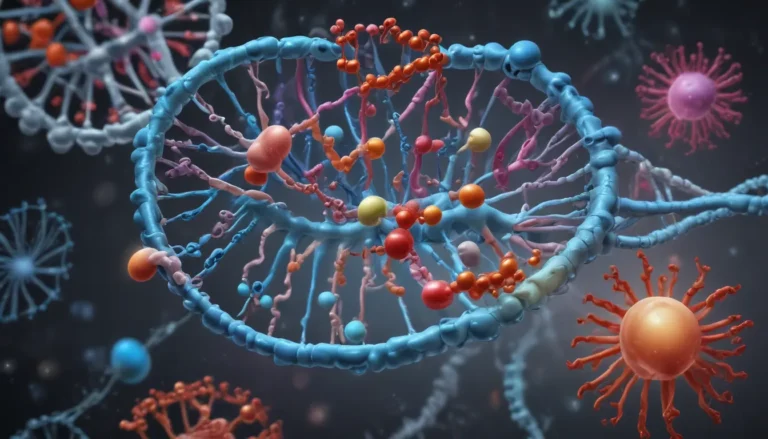A Note About Images: The images used in our articles are for illustration purposes only and may not exactly match the content. They are meant to engage readers, but the text should be relied upon for accurate information.
Welcome to the fascinating world of genome editing techniques, where the manipulation of genetic material holds the key to groundbreaking advancements in biology. From the discovery of CRISPR to the latest innovations in gene therapy, the potential of genome editing is truly awe-inspiring. Whether you’re a scientist, a biology enthusiast, or simply curious about the wonders of genetic engineering, join us on a journey through 14 captivating facts about genome editing techniques that are shaping the future of biology.
Understanding Genome Editing: A Revolution in Genetics
- Genome editing techniques like CRISPR Cas9 and TALENs offer precise ways to modify DNA, providing hope for treating genetic diseases and unlocking the mysteries of human genetics.
- Ethical debates surrounding genome editing, such as concerns about designer babies and off-target effects, highlight the importance of responsible use and regulation in genetic engineering.
The Discovery of CRISPR: A Game-Changer in Genetics
- The discovery of CRISPR (Clustered Regularly Interspaced Short Palindromic Repeats) has revolutionized genome editing, allowing scientists to precisely edit DNA and explore new possibilities in genetic manipulation.
CRISPR Cas9: The Swiss Army Knife of Genetic Engineering
- CRISPR Cas9, a versatile genome editing tool, uses RNA-guided Cas9 nuclease to target specific DNA sequences and introduce modifications, making it a valuable asset in various fields of research and biotechnology.
The Power of Zinc Finger Nucleases in Genome Editing
- Zinc Finger Nucleases (ZFNs) are artificial restriction enzymes that can be designed to bind and cut specific DNA sequences, enabling targeted modifications in both research and therapeutic applications.
Precision Tools for Genome Editing: TALENs
- Transcription Activator-Like Effector Nucleases (TALENs) are designer proteins that can be engineered to bind to specific DNA sequences and introduce precise changes, proving effective in a wide range of organisms.
Harnessing Homologous Recombination for Fine-Tuning DNA
- Homologous Recombination, a natural process, can be utilized for genome editing by guiding the repair of double-stranded breaks in DNA with a DNA template, allowing for precise modifications and advancements in gene therapy research.
Genetic Engineering in Agriculture: Promises and Potential
- Genome editing techniques in agriculture offer promise in modifying genetic traits of crops to develop resilient and nutritious varieties, contributing to food security and sustainability.
Insights into Human Genetics: Unraveling the Genetic Code
- Genome editing has revolutionized the study of human genetics by introducing specific mutations in human cells, providing insights into genetic diseases and potential therapies.
Creating Disease Models for Biomedical Research: A Path to Discoveries
- Genome editing enables the creation of precise disease models in various organisms for studying complex diseases and testing potential treatments, advancing biomedical research.
Ethical Considerations in Genetic Engineering: A Moral Compass
- Important ethical questions surround genome editing, such as making heritable changes in human DNA and altering the germline, emphasizing the need for responsible use and ethical considerations.
Controversy Surrounding Designer Babies: Balancing Science and Ethics
- The controversial concept of ‘designer babies’ raises concerns about modifying embryos to enhance genetic traits, sparking debates on societal inequality and the ethical implications of genetic manipulation.
Genome Editing for Conservation: Preserving Biodiversity
- Genome editing techniques can aid conservation efforts by preserving endangered species through manipulating genes to increase resilience to environmental challenges.
Challenges in Genome Editing: Addressing Off-Target Effects
- Genome editing techniques face challenges such as off-target effects where unintended changes occur in the genome, prompting researchers to minimize these risks for safe and effective genetic modifications.
Advancements in Delivery Systems: Enhancing Therapeutic Applications
- Significant advancements in delivery systems for genome editing tools have expanded possibilities for therapeutic applications, improving efficiency and safety in introducing editing machinery into target cells.
The Future of Genetic Engineering: A Path to Innovation
- The future of genome editing holds exciting possibilities with ongoing research and innovation likely leading to more precise and efficient techniques, paving the way for new frontiers in genetic engineering.
In conclusion, genome editing techniques are transforming the field of biology, offering endless possibilities for advancements in human health, agriculture, and environmental conservation. As we navigate the ethical considerations and challenges in genetic engineering, the future of biology holds tremendous promise with continued research and responsible use of these revolutionary techniques. Explore the world of genome editing with curiosity and a commitment to ethical and responsible innovation.
FAQs about Genome Editing Techniques:
- What is genome editing and how does it work?
-
Genome editing refers to the precise modification of an organism’s DNA using techniques like CRISPR-Cas9, TALENs, or zinc finger nucleases to add, remove, or modify specific genetic material.
-
How does CRISPR-Cas9 function in genome editing?
-
CRISPR-Cas9 utilizes guide RNA sequences to target specific genes, allowing the Cas9 enzyme to cut the DNA at desired locations for introducing changes through repair mechanisms or the insertion of new genetic material.
-
What are the applications of genome editing?
-
Genome editing has diverse applications in gene therapy, crop improvement, environmental conservation, and basic research, offering ways to treat diseases, enhance crop yields, protect endangered species, and understand gene function.
-
What ethical concerns are associated with genome editing?
-
Genome editing raises ethical questions about editing germline cells, unintended consequences, potential misuse, and the need for transparency and regulatory oversight in genetic engineering research.
-
What are the future prospects of genome editing?
- The future of genome editing looks promising with ongoing advancements and potential applications in healthcare, agriculture, and conservation efforts, aiming to improve human health, crop yields, and biodiversity with responsible and ethical use of these technologies.






